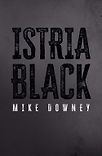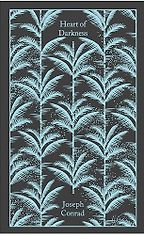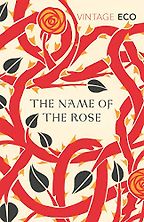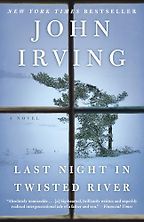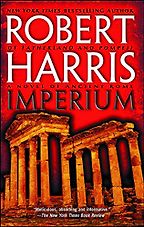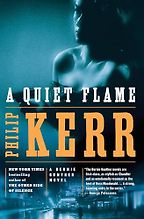What do you look for in a historical thriller?
I look for a powerful controlling idea and a craftsmanlike, careful building of momentum and tension in the plot. I like historical thrillers that don’t demonstrate and display research but make me feel as if I am there, present in the room. I want characters that I can know intimately and can love – or loathe: in short, people one wants to spend time with. Great characters are the key and will lead the reader through an unfamiliar time and place. The confidence of knowing the research has been done, to make the thriller fiction feel authentic to the reader, makes sure one is halfway towards creating a novel that people will want to read and won’t be able to put down.
This having been said, the research should marinade in the writing blending it with authenticity rather than trying to stuff in every single detail. I’m looking for the sounds, the smells, the hopes and the fears of the people and their period.
Your first choice is Joseph Conrad’s Heart of Darkness, first published in 1899. It’s appeared on Five Books several times before, with the war correspondent Martin Bell memorably describing it as being “both pro- and anti-imperialist.” Why do you recommend it in this context?
Joseph Conrad, or Józef Teodor Konrad Korzeniowski, was a Polish-born writer—actually, in what is now Ukraine—who became a master of the English language. I consider him to be one of the greatest novelists in English literature, historical fiction or not.
Not only is the novel a powerful critique of European colonialism in the Congo Free State during the late 19th century, it’s extraordinarily innovative as literature. Its Modernist style, unreliable narrator, and complex psychological themes were carving an original furrow in the literary landscape of his time.
And as you say, there are the imperialist aspects – but what makes its presence endure are the crucial themes of racism, exploitation, and Western guilt, making it a bravura piece on the pernicious nature of colonialism.
Next, you have chosen to recommend Umberto Eco’s The Name of the Rose. It’s a medieval murder mystery. Tell us more.
I first encountered the book in my friend, the great German producer, Bernd Eichinger’s production of the film of the same name—directed by Jean-Jacques Annaud.
Essentially the book is a a whodunnit set in a medieval monastery. It’s a meeting of worlds. A fairly simple, but gripping detective story is the excuse for a freewheeling wander through and exploration of much more complex subjects like medieval philosophy, religious dogma, and semiotics, all based within a meticulously researched and recreated 14th-century Italian monastery.
This is a sophisticated and beautifully investigated novel that draws on detective fiction traditions like Sherlock Holmes—the main protagonist is called William of Baskerville—to examine hypocrisy and corruption within the Catholic faith. Taking the lid off the shenanigans of Papists is always a good idea.
Eco himself is a fascinating figure. I’ve encountered his academic work as a medieval historian, but I know he wrote extensively on semiotics. It’s interesting that he chose to make forays into fiction throughout his life, often successfully. What do you think we gain from working and thinking in very different mediums?
I used to be structuralist, but now I’m not Saussure.
Very good.
It’s an old one. If Ferdinand de Saussure is considered the father of semiotics, then for sure Eco was a disciple who moved beyond his linguistic focus looking at a more dynamic and culturally-bound approach to signs. One of my favourite authors and Eco’s favourites too was Anthony Burgess.
They met when Burgess was living in Rome in the early 1970s. Eco, who worked as a radio producer, interviewed Burgess in connection with Joysprick, a book about the semiotics of James Joyce. Burgess was an incredible polymath known for his work as a novelist, poet, playwright, composer, translator, and critic. He is not known for his historical fiction so much, hence not mentioned as such here, but his prolific career also included dozens of other novels, nonfiction books, symphonies, and thousands of other musical compositions and articles.
Many of our readers will be familiar with A Clockwork Orange.
Burgess experienced the blossoming of the Modernist movement and the emergence of a post-war or Postmodern culture. All the arts informed the work of this great writer – in much the same way as Eco – whose focus outside of literature was more academic and philosophical who wrote influential non-fiction works, essays, and newspaper columns on topics such as semiotics, literary theory, and cultural criticism.
In the same way Burgess was a prolific composer and considered music a core part of his identity. He wrote over 250 musical works and was also a translator of operas and plays like Carmen and Oedipus Rex. The quintessential uomo universale.
Do you see your filmmaking as a complementary practice to your fiction writing? Are there any ways in which the two conflict?
Novels and novelists are all over the film business. As a filmmaker I have worked with writers like James Ellroy, Gunter Grass, Colm Tóibín, Iain Banks, Thomas Keneally, Lee Hall, and David Grossmann – and my most recent film, which has just become the Polish Oscar candidate, is a biopic of Franz Kafka, Franz, directed by Agnieszka Holland.
So, the two things in my life are entirely bound up in each other – almost inseparable. As a producer, I am often optioning novels, and then bringing on the writers and the directors afterwards, so there is a symbiotic relationship between director, writer and producer – the Holy Trinity.
When a book is being adapted for the screen, creative liberties are exercised and with them, the originality of the book may witness a certain extent of cinematic twist. Some books, like The Maltese Falcon by Dashiell Hammett, could actually stand as the screenplay of the film – they are so close. For me, the one thing people seem to forget when comparing movies to the books they are based on, is that movies are designed to be experienced in one sitting, while most books are read at one’s own pace over time.
Absolutely. I’ll keep us moving. I was familiar with some of John Irving’s work—The World According to Garp, The Cider House Rules—but not your next recommendation, which is his 2009 book Last Night in Twisted River, which opens in a logging settlement in the 1950s.
Last Night in Twisted River, Irving’s twelfth novel, depicts the United States as a world “where lethal hatreds were generally permitted to run their course.” I find this theme so apposite for the times in which those United States now find themselves. Aside being his most meta novel, it’s also probably his most prescient one as it charts America’s descent into post-imperialism. The book is a massive accomplishment of a master novelist at the peak of his powers.
Dickens is his inspiration – and along the way he picks apart the major issues facing contemporary America channelled through the prism of his own story. Like Dickens, he never shies away from high emotion, self-revelation, and even sentimentality. For that I love him.
There’s a place for sentimentality! You’ve selected Imperium by Robert Harris, one of the masters of the historical thriller genre, next. It narrates the life of the Roman senator Cicero, as seen through the eyes of a slave. Would you tell us more?
Anyone who has read my previous novel, Istria Gold, will be aware of my passion for the classical and devotion to the depiction of the Roman Empire in all its sophistication and gory brutality.
Harris is a great historical thriller writer. He has a deftness of touch and way of writing that depicts the classical period as being very vivid and very modern – and most importantly, not without humour and the ability to subvert himself from time to time. Imperium is not just about Cicero and his servant Tiro, but it’s a profound comment on the last days of the Roman Republic.
Oddly enough it has much in common with Robert Graves seminal I, Claudius. Like I, Claudius, Imperium takes the form of a memoir and synthesizes the past and the present, classical and modern, in an extraordinarily entertaining manner. Utterly masterful.
I think that brings us to Philip Kerr’s A Quiet Flame. Would you introduce it to our readers?
Two great Scottish writers who have left us far too soon are Iain Banks, who I worked with on an adaptation of his short story ‘A Gift From the Culture,’ and Philip Kerr. Kerr created probably one of the most memorably amoral characters in 20th-century crime fiction: the tough-talking, wise-cracking, womanising detective, Bernie Gunther.
His Chandler-esque, Marlowian, essentially Berliner detective novels are and extraordinary mix of great storytelling and superb research, creating a totally authentic human character and Berlin cityscape. Part of my book Istria Black takes place in Berlin and most specifically there is a key scene in the Hotel Adlon, that I think pays homage to the spirit of Kerr and Gunther.
Posing as an escaping Nazi war-criminal our anti-hero Bernie Gunther arrives in Buenos Aires and, having revealed his real identity to the local chief of police, discovers that his reputation as a detective goes before him. Part of Istria Black takes place in wartime and post-war Buenos Aires and Argentina, so provided me with inspiration, giving a whiff of the times and the customs.
Black is set in the Croatian community of NDH fascists who escaped via the Vatican Ratlines to live freely under the protection of Juan and Evita Peron in the aftermath of the Second World War. Bernie finds himself in Argentina, alongside a bunch of unsavoury characters including Adolf Eichmann. My hero Pepi Mihailic along with ex-Partizanka, Faida, set out in search of the Ustasha leader Ante Pavelic in order to eliminate him. Retribution looms in both.
Would you say you have taken literary inspiration from the writers you recommend?
I won’t go so far as to misquote Picasso, who may have said that lesser artists borrow; great artists steal – and who might in turn have been rephrasing Stravinsky, whose words could have originated in T.S. Eliot’s dictum –
Immature poets imitate; mature poets steal.
But, for sure, inspiration from Irving, Conrad, Kerr, Burgess, Harris and Eco is present in my most recent work as a novelist. “What has been, will be again, what has been done will be done again; there is nothing new under the sun.” That’s Ecclesiastes 1:9.
But then again, we have the Presocratics – Heraclitus – not stepping in the same river twice. Both the river and the person are in a state of perpetual change; the water in the river constantly flowing and being replaced, and the person stepping into it also changing in the time between the two steps.
Inspiration can be a complex series of influences and confluences.
Interview by Cal Flyn, Deputy Editor
October 25, 2025. Updated: October 27, 2025
Five Books aims to keep its book recommendations and interviews up to date. If you are the interviewee and would like to update your choice of books (or even just what you say about them) please email us at [email protected]
Five Books interviews are expensive to produce. If you've enjoyed this interview, please support us by donating a small amount.

